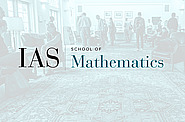Previous Special Year Seminar
Nov
02
2023
Nov
01
2023
Oct
26
2023
Special Year Learning Seminar
Hitchin Maps in Non-Abelian $p$-adic Hodge Theory
10:00am|Simonyi 101 and Remote Access
Oct
25
2023
Special Year Seminar
$p$-adic Hodge Theory and Simpson’s Correspondence
2:00pm|Simonyi 101 and Remote Access
Oct
19
2023
Special Year Learning Seminar
The $p$-adic Simpson Correspondence for G$_m$
10:00am|Simonyi 101 and Remote Access
Oct
18
2023
Special Year Seminar
Test Ideals in Mixed Characteristic via the $p$-adic Riemann-Hilbert Correspondence
2:00pm|Simonyi 101 and Remote Access
Oct
12
2023
Oct
11
2023
Special Year Seminar
Prismatic F-gauges and Fontaine-Laffaille Modules
Vadim Vologodsky
2:00pm|Simonyi 101 and Remote Access
Sep
21
2023
Jun
06
2023
Special Year Research Seminar
On Dynamics of B-free Systems Generated by Behrend Sets
Stanisław Kasjan
2:00pm|Simonyi 101 and Remote Access
